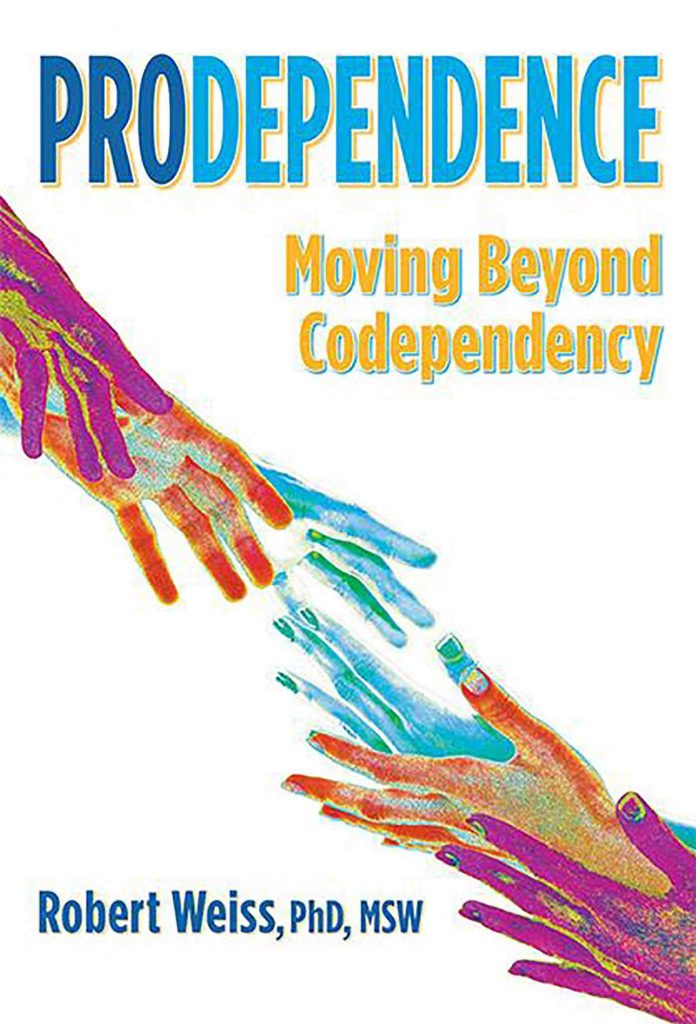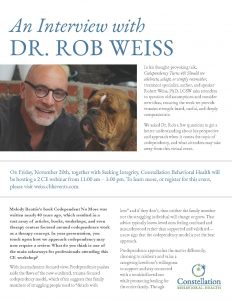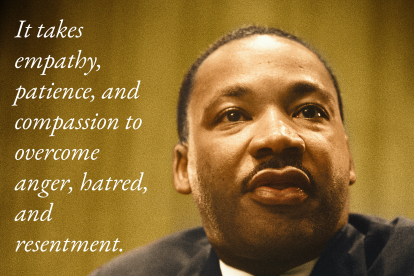Interview With Dr. Rob Weiss: “Codependency Turns 40! Should we celebrate, adapt, or simply reconsider?”

On Friday, November 20th, together with Seeking Integrity, we will be hosting a 2 CE webinar from 11:00 am–1:00 pm. In his thought-provoking talk, Codependency Turns 40! Should we celebrate, adapt, or simply reconsider?, treatment specialist, author, and speaker Robert Weiss, PhD, LCSW asks attendees to question old assumptions and consider new ideas, ensuring the work we provide remains strength-based, useful, and deeply compassionate. To learn more, or register for this event, please visit weiss.cbhevents.com.
We asked Dr. Rob a few questions to get a better understanding about his perspective and approach when it comes the topic of codependency, and what attendees may take away from this virtual event.
___
 Melody Beattie’s book Codependent No More was written nearly 40 years ago, which resulted in a vast array of articles, books, workshops, and even therapy centers focused around codependence work as a therapy concept. In your presentation, you touch upon how we approach codependency may now require a review. What do you think is one of the main takeaways for professionals attending this CE workshop?
Melody Beattie’s book Codependent No More was written nearly 40 years ago, which resulted in a vast array of articles, books, workshops, and even therapy centers focused around codependence work as a therapy concept. In your presentation, you touch upon how we approach codependency may now require a review. What do you think is one of the main takeaways for professionals attending this CE workshop?
With its attachment-focused view, Prodependence pushes aside the flaws of the now-outdated, trauma-focused codependency model, which often suggests that family members of struggling people need to “detach with love” and if they don’t, then neither the family member nor the struggling individual will change or grow. That advice typically leaves loved ones feeling confused and misunderstood rather than supported and validated—a sure sign that the codependency model is not the best approach.
Prodependence approaches the matter differently, choosing to celebrate and value a caregiving loved one’s willingness to support and stay connected with a troubled loved one while promoting healing for the entire family. Though Prodependence was initially formulated to help people in relationship with addicts and other struggling loved ones, the principles are applicable to everyone. After all, none of us lives in a vacuum, and no relationship is ever perfect.
Can you share a significant example of how the concept of codependency has shifted throughout your career?
Initially, the concept of codependency was about caring for yourself as well as your struggling loved one. But over time it has shifted toward caring for yourself instead of your struggling loved one. Think about the publication of books like Women Who Love Too Much. Is it really possible to love too much? I think it isn’t. We can love in ways that are not helpful, but we cannot love too much. These days, however, codependency seems to think we can.
Codependency has never been formalized as a diagnosis in the DSM or ICD. Do you feel it should be? Why or why not.
There has never been a need for a codependence diagnosis because, for decades, the Diagnostic and Statistical Manual of Mental Disorders (the DSM) has had a fully fleshed out, criteria-based diagnosis for people who are so emotionally limited and impaired that they cling to other people for their own emotional stability. It’s called Dependent Personality Disorder. Sadly, over time, codependence (as it was originally intended) has morphed and become conflated with DPD. Moving from the codependence model into the Prodependence approach should put a stop to this confusion.
Do you believe the codependence approach can be counterproductive?
Yes, and it frequently is. Codependence, by definition, implies that there is something wrong with the person who loves, helps, and cares for a struggling family member. This is especially true if that person has given up essential parts of himself or herself in the process. Embracing the codependence model requires loved ones of addicts and other struggling individuals to accept that there is something wrong with them that they need to fix. This often causes caregiving loved ones to feel misunderstood and judged. As a result, many leave treatment and 12-step healing before they receive the help they desperately need.
What can attendees expect to come away with from this presentation that’s new and useful that they can bring to their work?
I initially formulated the Prodependence model because I’d seen too many loved ones of addicts and other troubled people turn away from desperately needed direction and support because they couldn’t or wouldn’t accept the codependence tenet that being in relationship with a troubled person automatically means there is something wrong with them. Basically, the codependence model, for these people, has felt more negative and alienating than invitational. Prodependence provides another option. Prodependence recognizes the inherent grace of caregivers, applauding and appreciating their unconditional love, their courage, and their conviction in trying to support their struggling loved ones while also caring for themselves. Prodependence also recognizes that every relationship, even those that are incredibly healthy, can be strengthened within the prodependence framework.
How are attachment disorders or trauma disorders related to codependency?
Codependence is a model of human behavior based in trauma theory. To be codependent implies that one tends to bond with those with whom interactions mirror early-life trauma (neglect, abuse, abandonment, etc.) For example, these individuals may tend to bond with an addict. And then, according to the codependency model, failure on the part of the addict triggers the non-addict to act in ways that re-create their traumatic childhood through this troubled adult relationship.
Codependence implies that the loved ones of addicts, due to their underlying, often unconscious childhood issues, tend to, as adults, give too much and love too much. Thus, they attract, enable, and enmesh with addicted or otherwise struggling people. The goals of codependency treatment and recovery (through programs like CoDA) revolve around themes of detachment, becoming less needy, and working through past trauma to become more aware, less enabling, and less accepting of troubled, emotionally unavailable people.
Prodependence is a model of human behavior based in attachment theory. To be Prodependent implies that people are able to create deep, bonded adult attachments that mirror their very human, very normal longings for healthy dependence and intimacy. Prodependence assumes that, when one loves and bonds deeply, it is natural (and therefore non-pathological) to do whatever it takes to ensure the safety and wellbeing of those with whom one is attached.
Prodependence implies that loved ones of struggling individuals, regardless of prior history, will take extraordinary measures to keep those they love stable and to ensure the safety of their families. There is no pathology assigned to loving in Prodependence. Instead, Prodependence asserts that loving addicts and other chronically troubled people healthfully requires a different and perhaps more boundaried form of love than with healthier people.
Is there anything else you would like to share with or express to fellow colleagues about this topic?
Any loving person in a meaningful relationship with an addicted or otherwise struggling person is, by definition, in need of support. He or she likely needs encouragement toward both greater self-care and establishing healthy boundaries with their troubled loved one. However, no loving person in a meaningful relationship with a troubled individual should be asked to doubt the nature of his or her love, or to question his or her own emotional stability, in order to be taught such skills and to be given the support that he or she deserves.
To learn more, or register for our upcoming 2 CE virtual webinar with Dr. Rob Weiss on November 20th, please visit weiss.cbhevents.com.








